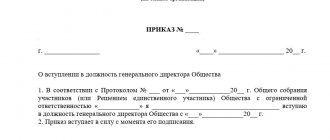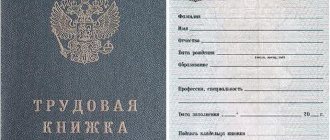According to the legislation regulating labor relations, a citizen who has actually started working for an employer is considered an employed employee. Labor relations are considered to be the fulfillment of any assignments for which the employer pays remuneration to employees.
The law obliges employing companies to sign a written employment agreement with a citizen before starting work. If the employment contract is not properly drawn up, the employer has another reason to worry.
What should an employment contract be?
Employment contract: concept and main parts
The law establishes that an employment contract is a written agreement between a citizen and his employer, where, before the start of the performance of labor functions, the mutual obligations and rights of the parties are determined, as well as the terms of remuneration for the work performed.
An employment contract must have the following details:
- General part. Information about the employer is included here (full name of the company, full name of the manager authorized to sign employment agreements, full name and data of the future employee). Legal addresses and other contacts of one or two parties may be included.
- Employer obligations. This part of the agreement contains a list of obligations imposed on the employer (including at the legislative level) to create normal working conditions, the level of wages, provide compensation, benefits, certain restrictions on overtime work or attracting an employee (especially if he is a minor) to work for hazardous or harmful production. It also describes the vacations due to the employee (if their number is greater than that required by law).
- Employee obligations. Typically, this block contains standards for what the employee will have to do during the implementation of the functions assigned to him, his work and rest schedule is established, intentions are declared, what can and should be done, and also what is prohibited from doing.
- Responsibility of the parties. Such a block provides a section regarding cases if one of the parties to the agreement does not fulfill its obligations.
- Qualification requirements. This block must include the requirements necessary for performing a specific job that the employee must meet (level of education, work experience, qualifications for the specialty).
- Signatories. The document is signed by both parties in at least two original copies, one for the signing party. The employer's signature may additionally be sealed with the company's seal. In some cases, such agreements are internally registered within the organization. If the employer’s party is a private entrepreneur, then the agreement will have to be registered with local authorities.
Remember, the law requires only a written form of employment agreement. True, this does not mean at all that a citizen will not be able to perform work and receive remuneration for it, even if such an agreement is not signed. However, in the future you will still have to draw up such a document (sometimes after paying a fine to the state treasury).
What to do if the employer does not conclude a contract?
According to the general rule, Article 67 of the Labor Code of the Russian Federation, the employer must conclude an agreement within 3 days. It is quite possible that some minor difficulties may arise, but if the employer has not concluded an employment contract for a month and is constantly delaying this moment, then the alarm should be sounded.
To solve this problem, you can contact the following authorities:
- Labour Inspectorate;
- court.
Labor inspection is the initial stage of an employee’s application to protect their labor rights. This organization exists in every city, which is authorized to initiate administrative proceedings against the employer in case of violations of the Labor Code of the Russian Federation.
You can contact this institution either in person or through an electronic application on the official website https://onlineinspektsiya.rf. However, before this you need to register on the government services website. Within 30 days, the request will be reviewed by competent persons and a response will be given.
If the labor inspectorate does not help in solving the problem, then all that remains is to go to court. Moreover, labor disputes are considered only by the district court. To do this, you need to contact a judicial institution of your choice: both at the employee’s place of residence and at the location of the employer.
In connection with changes to the Code of Civil Procedure of the Russian Federation dated December 3, 2016, such workers can now apply to their local district courts to resolve labor disputes. This makes the task much easier. Then you need to draw up a regular claim in writing, which must meet the requirements of Art. 131 Code of Civil Procedure of the Russian Federation.
All documents are attached to the claim. Next, the court considers the case and can make a decision in favor of both the employee and the employer. It all depends on the evidence presented.
REFERENCE! There is a special limitation period for labor disputes. The employee must go to court within 3 months from the day he became aware of a violation of his rights in accordance with Art. 392 Labor Code of the Russian Federation.
What is actual permission to work?
It is important to take into account that labor relations in the classical sense should arise on the following grounds:
- when a citizen was elected to office;
- approved or appointed to a specific vacant position;
- referred for employment from the labor exchange using the existing quota;
- when there is a court decision obliging the employer to execute a written labor agreement with the citizen;
- when a previously concluded civil law contract is reclassified into an employment contract after a trial.
What to do if the contract is not signed by the employee
The employee did not sign the contract: what to do?
Considering that an employment agreement is a written bilateral document, it must be signed by two (otherwise it will not gain legal force), and the employer is required to draw it up. It was defined this way because of its ability to influence such relationships directly.
Here the legislator clearly provided for the employer’s liability for non-signing (untimely signing) of such an agreement. As for the hired employee, everything is much more complicated here.
Today, the Labor Code does not contain any provisions obliging an employee to sign an employment contract. In practice, there are often situations where an employee actually performs the job functions assigned to him, but for personal reasons does not want to sign the document. Typically the main reasons are:
- unsatisfactory salary level;
- lack of an appropriate (from the employee’s point of view) level of work organization;
- the need to perform additional functions (it often happens that the first copy of the contract is signed, but further changes and additions that expand the list of responsibilities are not signed);
- when initially there was an oral agreement to fulfill certain duties, and in the contract drawn up a little later, other duties appeared.
Remember, if an inspection by a competent authority reveals a violation in terms of drawing up a written form of an employment contract (even if it is signed by the employer, but not signed by the employee), he will be held accountable.
Therefore, in order to avoid an unpleasant situation, employers should consider and put into practice the following points:
- strictly comply with the norms stipulated by law for the timely signing of employment contracts (first the contract, then permission to work);
- in the event of an employee’s refusal of the proposed working conditions, salary level, or other reasoned changes, formalize such refusals in acts signed by at least three persons, in order to subsequently have an evidence base for the full fulfillment by the employer of the obligations assigned to him;
- apply disciplinary measures to an employee who does not want to sign an employment contract (this will have to be done within the framework of the specific position for which such an employee was previously hired and the service instructions attached to such position) up to and including dismissal from the position;
- remove the employee from performing labor functions (especially if he works in hazardous or harmful production) until the signing of an employment contract. Motivation – violation of labor safety standards.
Negative aspects and penalties for lack of contracts
An employee who has worked for a company for more than three days must be employed on the basis of Article 16 of the Labor Code of the Russian Federation. It also describes labor relations. The fact is that when an employee is allowed to work with the consent or at the request of the employer or deputy, they are already considered a working relationship, even if the document is not properly executed.
Based on Article 67, Part 2 of the Labor Code, a worker who has worked for more than three days should not work without a contract; the director is obliged to draw up a document with the formalities observed. Failure to comply with the law provides for liability for failure to conclude an employment contract with the employee and consequences for the employer in the form of penalties:
- Individuals face a penalty in accordance with Article 5.27 of the Code of Administrative Offences, from three to five thousand rubles.
- Officials will be fined from 10 to 20 thousand rubles for the lack of an employment contract.
- Legal entities will have to fork out from 50 to one hundred thousand rubles or suspend activities for up to three months.
If a worker is refused to draw up labor documentation or conclude documents in an unspecified form, a fine is provided:
- For an individual from 5 to 10 thousand rubles.
- Officials from 10 to 20 thousand.
An official who was previously prosecuted for the lack of an employment contract and who again finds himself guilty in this case, in addition to penalties, faces removal from office and prohibition from working in his specialty for a long time.
Responsibility for non-compliance with laws related to the conclusion of employment contracts, according to Article 2.1 of the Administrative Code, rests not only with the legal entity, but also with the employees. Based on Article 5.27 of the Code of Administrative Offenses, the number of offenders may be unlimited.
The above penalties are imposed only for formal documentation. For related violations related to non-payment of taxes and insurance contributions, stricter sanctions and liability of the employer are fraught.
For example, guided by Article 199 of the Criminal Code of the Russian Federation, a fine of one hundred to three hundred thousand rubles, or restriction of freedom for a period of two years is provided. If a larger amount of contributions is revealed to be transferred to the tax authorities, a fine of up to five hundred thousand rubles or 6 years of imprisonment may be imposed.
According to Federal Law No. 212, evasion of insurance contributions to the Pension Fund of the Russian Federation is fraught with repayment of the identified debt in the form of penalties, including fines in favor of the state:
- in case of unintentional concealment of income - 20%;
- when wet - 40%.
What to do if the contract is not executed in due time
The deadline for signing a written agreement, when the employee is actually authorized to perform work functions, is clearly established by law. It's three days.
But in practice, cases are identified when employees perform their labor functions for years without having written employment contracts. At the same time, the initial conditions under which they began to work (usually the level of remuneration for work) have already changed several times.
In such cases, there are several options for resolving this situation:
- Sign the agreement retroactively. This is practiced if the employer has not changed since the day the employee was actually admitted to work. It is important that during the entire period of work the absence of labor agreements is not recorded by inspection or regulatory authorities. It is also worth immediately taking into account the dates of drawing up such a document, the conditions in force at the time of “signing”, as well as registration (if one was present).
- Sign the document on the day of discovery of his absence. This option is used by employers who have already been punished by paying a fine for not having a written employment contract. Here the conditions in force at the time of signing are written out (with all changes and additions that were introduced during the period of the employee’s actual work). Considering that the employer has already been punished (paid a fine), they no longer have the right to hold him accountable for such a violation again.
- Sign on the day of discovery, but extend the start of the contract from the day the employee actually performs his duties.
A rather complex form of written agreement. After all, here you will have to take into account standards that differed from those in force at a particular moment (for example, wages), especially if you have to cover periods lasting more than a year. This solution is optimal if it covers a period of several months (optimally - up to six months).
Remember, if a competent government agency detects a violation of labor laws in terms of the lack of a written agreement between the employee and the employer, it is easier to pay a fine and start everything from scratch. In this case, the likelihood of aggravating the situation (for example, being held accountable for forgery of documents) is reduced to zero.
Employment contract: important terms, legal consequences of improper execution. Part 3.
Subject of the employment contract
The following essential conditions must be specified in the employment contract:
-place of work and labor function (paragraph 2, 3, part 2, article 57 of the Labor Code of the Russian Federation
).
If a structural unit is indicated as the place of work, the employer, with the exception of certain cases, cannot transfer the employee to another structural unit without his written consent (Parts 1, 3 of Article 72.1 of the Labor Code of the Russian Federation
).
-the workplace specified in the employment contract cannot be changed without the written consent of the employee. If the employer unilaterally changed the place of work, and the employee did not return to the new place of work, then dismissal in this case for failure to return to work may be considered illegal, and the employer may be required to reinstate the employee at work.
The absence of essential conditions is not a basis for recognizing the contract as not concluded or for termination (Part 3 of Article 57 of the Labor Code of the Russian Federation
).
Moreover, for the absence of essential conditions specified in Part 2 of Art. 57 of the Labor Code of the Russian Federation
, the employer may be held administratively liable on the basis of Part 4 of Art.
5.27. Code of Administrative Offenses of the Russian Federation
.
If for a profession, specialty or position the Labor Code of the Russian Federation or other federal law provides for the provision of compensation and benefits or the presence of restrictions, then the name of the corresponding profession, specialty or position must correspond to the name specified in the relevant qualification directory ( Resolution of the Ministry of Labor of the Russian Federation dated 02/09/2004 No. 9 “On approval of the Procedure for applying the Unified Qualification Directory for positions of managers, specialists and employees”
, for example, see
Qualification directory of positions of managers, specialists and other employees
, approved.
Resolution of the Ministry of Labor of the Russian Federation dated 08/21/1998 No. 37
) or the corresponding professional standard (
Resolution of the Government of the Russian Federation dated 06/27/2016 No. 584
, for example, see
Order of the Ministry of Labor of Russia dated 09/08/2014 No. 610 n “On approval of the professional standard “Producer in the field of cinematography”
).
If the name is indicated incorrectly, the employer may be subject to administrative liability, and the employee may have difficulty obtaining benefits and compensation. In this case, the position (profession, specialty) specified in the employment contract must be provided for in the staffing table, otherwise the employer may be brought to administrative liability (Part 1 of Article 5.27 of the Code of Administrative Offenses of the Russian Federation
).
Also, the employer can, instead of indicating a position (profession, specialty), indicate a specific type of work if it is impossible to determine a specific position (profession, specialty) (paragraph 3, part 2, article 57 of the Labor Code of the Russian Federation
).
Terms of the employment contract
The employment contract must necessarily indicate the start date of work, and for a fixed-term employment contract, the duration of its validity and the reasons for concluding a fixed-term employment contract are also required (paragraph 4, part 2, article 57 of the Labor Code of the Russian Federation
).
For the absence of these conditions, the employer may be held administratively liable on the basis of Part 4 of Art. 5.27. Code of Administrative Offenses of the Russian Federation
.
If the contract does not indicate the start date of work, the employee must begin work on the next working day after the contract enters into force (Part 3 of Article 61 of the Labor Code of the Russian Federation
).
A fixed-term employment contract may be concluded in the cases specified in Art. 59 Labor Code of the Russian Federation
.
If you conclude a fixed-term employment contract without sufficient grounds established by the court, such an agreement is considered to be concluded for an indefinite period (Part 5 of Article 58 of the Labor Code of the Russian Federation
). Also, a fixed-term employment contract may be recognized as indefinite if the fixed-term contract was concluded with the employee more than once to perform the same job function.
If an employee is dismissed under a fixed-term employment contract, which is later recognized as indefinite, then such dismissal will be illegal, and the employer may be required to reinstate the employee at work and pay him moral damages and average earnings for forced absence (Article 237, Part. 1, 2, Article 394 of the Labor Code of the Russian Federation
).
If a fixed-term employment contract is concluded in connection with its implementation in an organization created for a clearly defined period or for the performance of a clearly defined work (paragraph 7, part 1, article 59 of the Labor Code of the Russian Federation
), then the employment contract is terminated upon liquidation of the organization (paragraph 14 of
the resolution of the Plenum of the Supreme Court of the Russian Federation dated March 17, 2004 No. 2 “On the application by the courts of the Russian Federation of the Labor Code of the Russian Federation”
).
A political party and its regional branches have the right to conclude fixed-term employment contracts with employees of the apparatus of the political party for a period not exceeding the term of office of the political party and its regional branches (paragraph 2, part 2, article 31 of the Federal Law of July 11, 2001 No. 95-FZ “On political parties"
).
Fixed-term employment contracts also include alternative civil service (paragraph 12, part 1, article 59 of the Labor Code of the Russian Federation
).
Completion of alternative civil service is possible only for those types of work, professions, positions, and also only in those organizations that are established by Order of the Ministry of Labor of the Russian Federation dated February 12, 2019 No. 81 n
.
If an employee is actually allowed to work without drawing up an employment contract, then a probationary period can be established if it is formalized by a separate agreement between the employee and the employer before starting work (Part 2 of Article 70 of the Labor Code of the Russian Federation
).
In general, the probationary period can be changed by additional agreement of the parties before its expiration (Article 72 of the Labor Code of the Russian Federation
).
According to Art. 70 Labor Code of the Russian Federation
when concluding an employment contract, it may include a condition on a probationary period, which cannot be more than 3 months, and for heads of organizations and their deputies, chief accountants and their deputies, heads of branches, representative offices or other separate structural divisions of organizations - no more than 6 months (Part 5 of Article 70
of the Labor Code of the Russian Federation
).
Meanwhile, when assigning a probationary period of more than 3 months, it should be taken into account that the title of a position, for example, “director,” in itself does not indicate a leadership position and, accordingly, the validity of a probationary period of more than 3 months may turn out to be illegal. For example, from the appeal ruling of the Moscow City Court dated December 12, 2017 in case No. 33-50578/2017,
it follows that the criterion for determining, in particular, a leadership position is not its name, but the authority for such a position.
For example, indicating an employee in the Unified State Register of Legal Entities as a person who has the right to act on behalf of a legal entity without a power of attorney, as well as having the right to sign documents on behalf of a legal entity, hiring and dismissing employees. Accordingly, if, according to his powers, a person does not belong to the category of managers or another category for which a probationary period can be set for up to 6 months, an indication in the employment contract of a probationary period of more than 3 months by virtue of Part 2 of Art. 9 of the Labor Code of the Russian Federation
will be illegal. In this case, the court will consider the dismissed employee as having failed the test to be unlawful if the period for dismissal on the grounds of failure to pass the test expires, and the employee, at his request, can be reinstated with payment of average earnings for the period of forced absence and moral damages.
When hiring for a period of up to 2 months, a probationary period cannot be established (paragraph 8, part 4, article 70, article 289 of the Labor Code of the Russian Federation
).
Working conditions
The employment contract must necessarily indicate working conditions in the workplace (paragraph 9. part 2 of article 57 of the Labor Code of the Russian Federation
).
Such conditions are indicated based on the results of a special assessment of working conditions (paragraph 17, part 2, article 22 of the Labor Code of the Russian Federation
, clause 1, part 2, article 4
of the Federal Law of December 28, 2013 No. 426-FZ “On the special assessment of working conditions”
).
If there are no working conditions in the employment contract, the employer may be held administratively liable on the basis of Part 4 of Art. 5.27. Code of Administrative Offenses of the Russian Federation
.
A special assessment of working conditions is not carried out in the cases specified in Part 3 of Art. 3 of the Federal Law of December 28, 2013 No. 426-FZ
.
If the work is of a special nature (mobile, traveling, on the road, etc.), then it must be indicated in the employment contract (paragraph 8, part 2, article 57 of the Labor Code of the Russian Federation
).
In order not to disclose confidential information, the employer must familiarize the employee, against receipt, with the list of information constituting a trade secret, the trade secret regime (Part 1, Article 11 of the Federal Law of July 29, 2004 No. 98-FZ “On Trade Secrets”
).
Information about the employee’s compliance with confidential information may be indicated in the employment contract (paragraph 4, part 4, article 57 of the Labor Code of the Russian Federation
).
It should be noted that according to paragraph 3 of the resolution of the Supreme Court of the Russian Federation dated 02.19.1993 No. 4521-1
“On the procedure for enacting the Law of the Russian Federation “On state guarantees and compensation for persons working and living in the regions of the Far North and equivalent areas”
the employee is entitled to state guarantees and compensation provided for by
the Law of the Russian Federation of February 19, 1993 No. 4520-1
, even if he works in the Far North region, in which the regional coefficient and percentage increase in wages are calculated, but not classified as regions of the Far North and equivalent to them localities.
Moreover, such guarantees and compensations are provided only at the main place of work, unless the employer, on his own initiative, provides such guarantees and compensations for part-time work (Part 4, Article 57, Part 1, Article 287 of the Labor Code of the Russian Federation
).
PS To be continued...
Dismissal when there is no employment contract
Dismissal without an employment contract
Considering that in addition to a written employment contract, when hiring, the employer also signs a corresponding order, the employee may well perform his job functions and then resign without signing an employment agreement. The work is carried out in accordance with local, official, general standards and instructions, a collective agreement that regulates the work of the company, on the basis of which its entire technological process is built.
Labor Code on registration of labor relations.
Labor relations are those based on an agreement between the employee and the employer (Article 15 of the Labor Code of the Russian Federation):
on the employee’s personal performance for pay of a labor function (work according to the position in accordance with the staffing table, profession, specialty, indicating qualifications, the specific type of work assigned to the employee);
on the employee’s subordination to the internal labor regulations when the employer provides working conditions provided for by labor legislation and other regulatory legal acts containing labor law norms, a collective agreement, agreements, local regulations, and an employment contract.
Labor relations arise between an employee and an employer on the basis of an employment contract concluded by them in accordance with the Labor Code (Article 16 of the Labor Code of the Russian Federation). Labor relations between an employee and an employer also arise on the basis of the employee’s actual admission to work with the knowledge or on behalf of the employer or his representative in the case where the employment contract was not properly drawn up.
For your information
An employment contract is an agreement between an employer and an employee, according to which the employer undertakes to provide the employee with work for a specified job function, to provide working conditions provided for by labor legislation and other regulatory legal acts containing labor law norms, a collective agreement, agreements, local regulations and by this agreement, to pay the employee wages in a timely manner and in full, and the employee undertakes to personally perform the labor function determined by this agreement, to comply with the internal labor regulations in force for this employer (Article 56 of the Labor Code of the Russian Federation). The parties to the employment contract are the employer and the employee.
The employment contract is concluded in writing, drawn up in two copies, each of which is signed by the parties (Part 1 of Article 67 of the Labor Code of the Russian Federation):
one copy of the employment contract is given to the employee;
another copy is kept by the employer.
An employment contract that is not drawn up in writing is considered concluded if the employee began work with the knowledge or on behalf of the employer or his representative (Part 2 of Article 67 of the Labor Code of the Russian Federation).
For your information
When an employee is actually admitted to work, the employer is obliged to conclude an employment contract with him in writing no later than three working days from the date the employee is actually admitted to work.
Hiring is formalized by an order (instruction) of the employer, issued on the basis of a concluded employment contract (Article 68 of the Labor Code of the Russian Federation). The content of the order (instruction) of the employer must comply with the terms of the concluded employment contract.
What responsibility awaits the employer?
In order to discipline company officials, in addition to declarative norms, Russian legislation provides for clear and very serious liability for violations. This may even lead to criminal liability. Of course, if an employee is found to be employed without signing a written employment agreement with him, the employer does not face a real prison sentence.
At the same time, for such an offense he may be subject to disciplinary or administrative liability, up to and including removal from office or dismissal from work. It all depends on the severity of the offense committed. You can receive a substantial fine or other punishment for the following violation:
- If an employee is allowed to work, and the employer refuses to admit it, the official responsible (who actually allowed it) faces a maximum fine of 20 thousand rubles.
- When an employer avoids concluding an employment contract or tries to replace it with civil law relations, officials can pay a maximum fine of 20 thousand rubles.
- When the above actions are repeated, officials may be removed from office (disqualified) for a period of one to three years.
- No more than 20 thousand rubles will be fined for employers who pay wages to employees untimely or not in full, and if such an act is recorded repeatedly, the amount of the fine may increase to 30 thousand rubles.
Remember, there is always an opportunity to formalize the employment relationship correctly. Even if this is done after some time. This will allow you to avoid responsibility, clearly distribute responsibilities and not escalate the situation in the work team.
Is it possible to work without an employment contract? Find out in this video:
Form for receiving a question, write yours
The judicial procedure for appealing the actions of the employer
In most cases, the resolution of a labor dispute is resolved in court, regardless of who initiated the dispute, the employee upon reinstatement at work or the employer if he collects the shortfall from the seller through the court.
In the event of a labor dispute about the obligation to conclude an employment contract, after preparing a statement of claim and sending it to the judicial authorities, the employee must collect a set of evidence confirming that she is actually carrying out labor activities for the employer, that this activity is carried out with the knowledge of the employer on his behalf, that is the employee needs to establish the fact of an employment relationship with his direct employer.
In the case of a positive decision based on a decision that has entered into legal force, the employee turns to the losing party and the employer carries out proper registration of the employee in accordance with the Labor Code of the Russian Federation.
Additionally, it should be noted that in the event of a legal dispute that ends in favor of the employee, the latter has the right to compensation for moral damage caused by the unlawful actions of the employer and is compensated by him on the basis of a judicial act.
ATTENTION: watch the video on the topic of protecting the labor rights of an employee, and also subscribe to our YouTube channel to be able to receive free online legal advice through comments on the video.
https://youtu.be/CbnXvU_D-Zg










